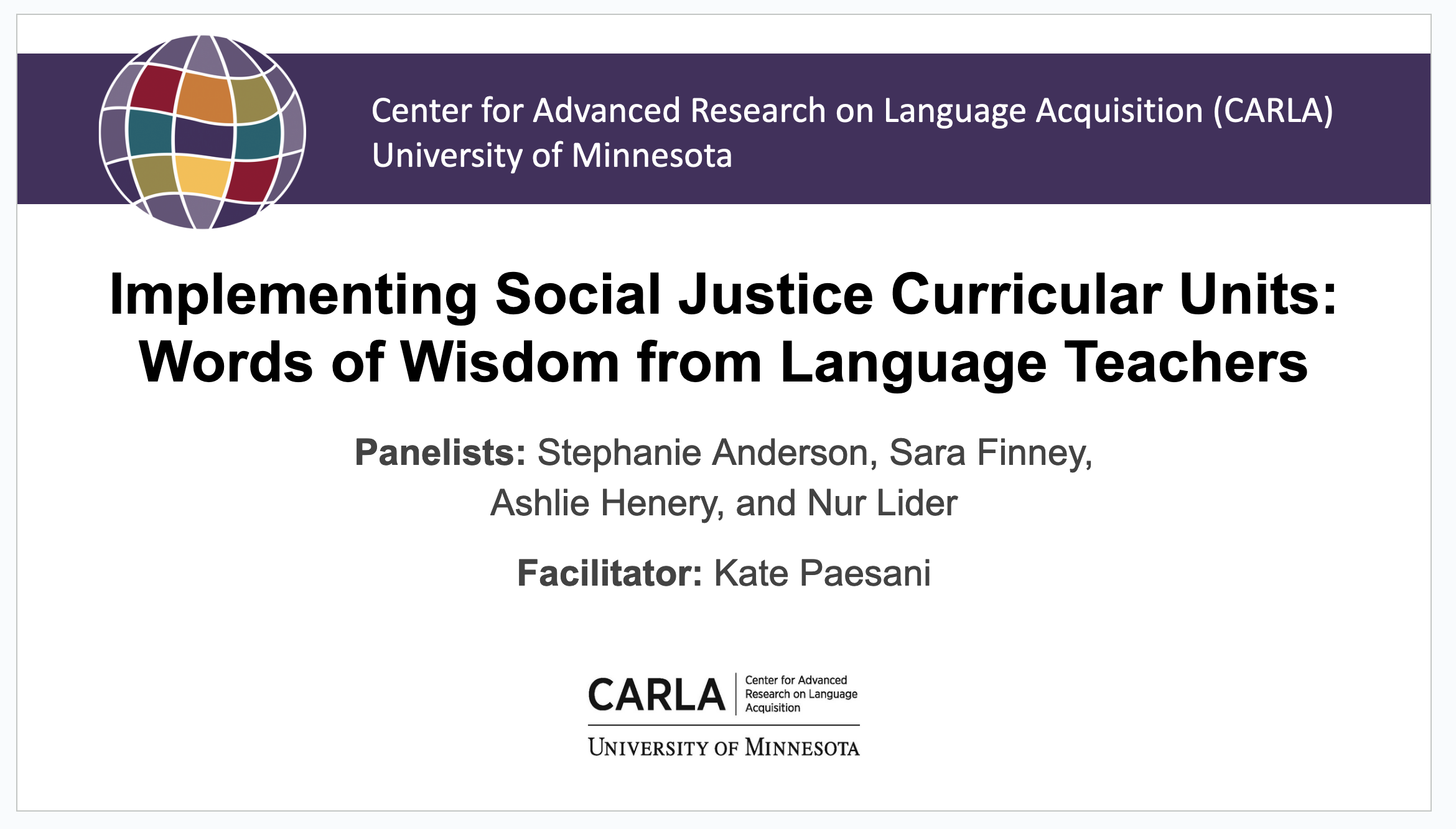Social Justice Curricular Units
An important goal of CARLA’s Social Justice in Language Education Initiative is to provide instructional materials in multiple languages that teachers can use and adapt to meet their needs and those of their students. From 2020-2023, CARLA’s Social SCILS project supported a team of curriculum developers, who drafted, piloted, and revised intermediate-level curricular units in nine languages: Arabic, Chinese, Dutch, French, German, Portuguese, Russian, Spanish, and Turkish. These units were designed with CARLA’s social justice planning templates and are available for download on this page. Learn about implementing social justice curricular units by watching the video at right.
All units are published with a CC-BY-NC-SA license, meaning that you can use, copy, adapt, and share them as long as you give appropriate attribution, share them using the same or similar license, and don’t use them for commercial purposes.
NOTE: To make adaptable copies of documents in the curricular unit folders, right click on the document and select “make a copy” from the pull-down menu.
Artistic Expressions of Individual and Cultural Identity (Spanish)
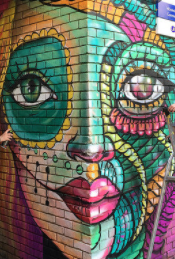 This social justice curricular unit for intermediate-level learners of Spanish introduces students to different art forms from Latin America, the United States, and their home communities. As they describe diverse art forms, identify artistic choices, and interpret meanings communicated through these choices, students learn to draw cross-cultural comparisons, understand multicultural identities, and create their own work of art. Essential questions explored in the unit are: What can art forms show us or allow us to show others about historical injustice, culture, and/or identity? Can art be used to raise awareness and/or inspire social action?
This social justice curricular unit for intermediate-level learners of Spanish introduces students to different art forms from Latin America, the United States, and their home communities. As they describe diverse art forms, identify artistic choices, and interpret meanings communicated through these choices, students learn to draw cross-cultural comparisons, understand multicultural identities, and create their own work of art. Essential questions explored in the unit are: What can art forms show us or allow us to show others about historical injustice, culture, and/or identity? Can art be used to raise awareness and/or inspire social action?
Framing and Migration (German)
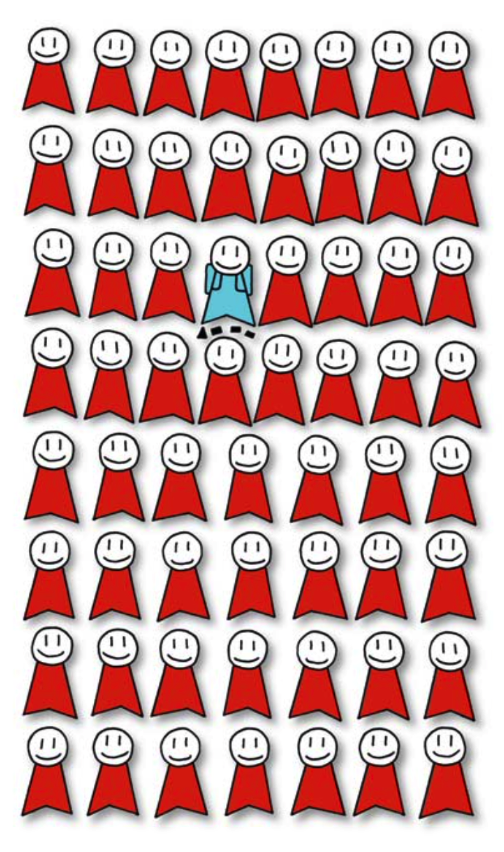 In this social justice curricular unit, intermediate-level learners of German explore historical and contemporary perspectives on migration in Germany and dissect the concept of “framing” and how it affects one’s perceptions of people and events. Students furthermore learn to express opinions and engage with individuals who may not share these options. The questions students address throughout the unit are: What cultural or religious differences between Germans and migrants seem “unbridgeable” and how does this affect immigrants’ welcome and acceptance? How do media reports regarding social justice issues such as migrants and refugees affect readers’ perceptions about these topics? Why is it important to get news from a variety of sources?
In this social justice curricular unit, intermediate-level learners of German explore historical and contemporary perspectives on migration in Germany and dissect the concept of “framing” and how it affects one’s perceptions of people and events. Students furthermore learn to express opinions and engage with individuals who may not share these options. The questions students address throughout the unit are: What cultural or religious differences between Germans and migrants seem “unbridgeable” and how does this affect immigrants’ welcome and acceptance? How do media reports regarding social justice issues such as migrants and refugees affect readers’ perceptions about these topics? Why is it important to get news from a variety of sources?
Green Cities (German)
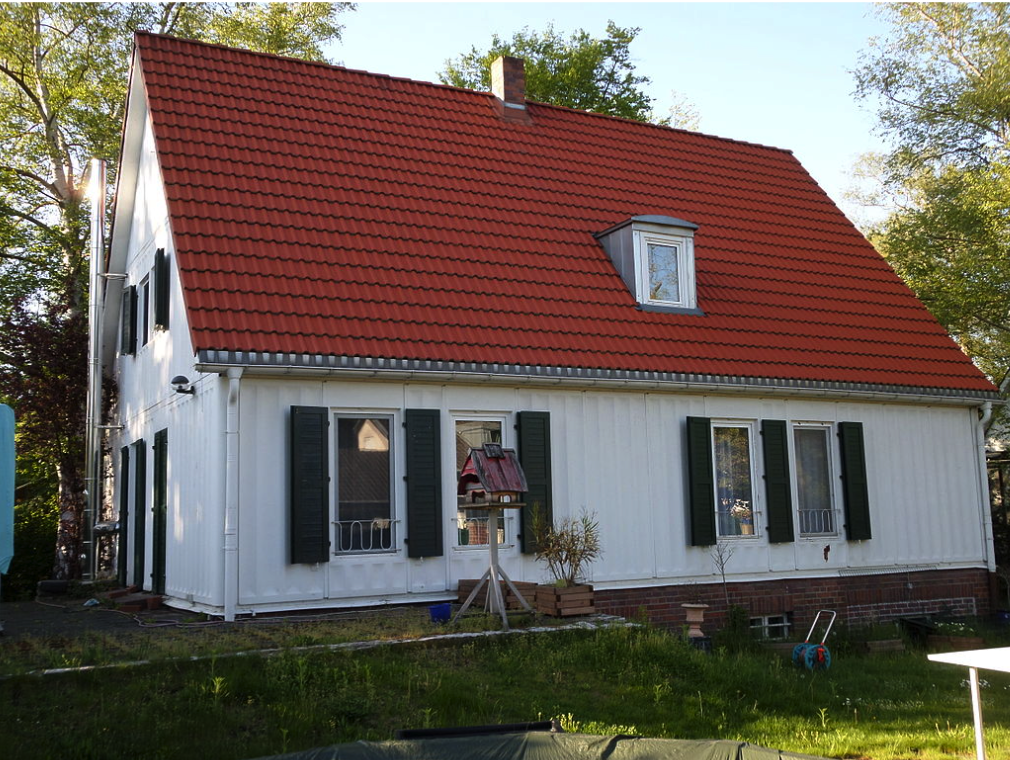 This social justice curricular unit equips intermediate-level learners of German with the skills and knowledge to discuss the impact of environmental factors on the health of city dwellers and issues of access to healthy city infrastructure. They furthermore analyze solutions to increase the health and well-being of city dwellers and propose a plan to mitigate environmental health risks and promote environmental justice. Essential questions framing this unit are: What is the relationship between a healthy life and the environment of the city? To what degree are the resources and infrastructure for a healthy life in the city distributed equitably? How can individuals and institutions make city life healthy and more sustainable for everyone?
This social justice curricular unit equips intermediate-level learners of German with the skills and knowledge to discuss the impact of environmental factors on the health of city dwellers and issues of access to healthy city infrastructure. They furthermore analyze solutions to increase the health and well-being of city dwellers and propose a plan to mitigate environmental health risks and promote environmental justice. Essential questions framing this unit are: What is the relationship between a healthy life and the environment of the city? To what degree are the resources and infrastructure for a healthy life in the city distributed equitably? How can individuals and institutions make city life healthy and more sustainable for everyone?
Multicultural Diversity of Russia: A Journey from Moscow to Dagestan (Russian)
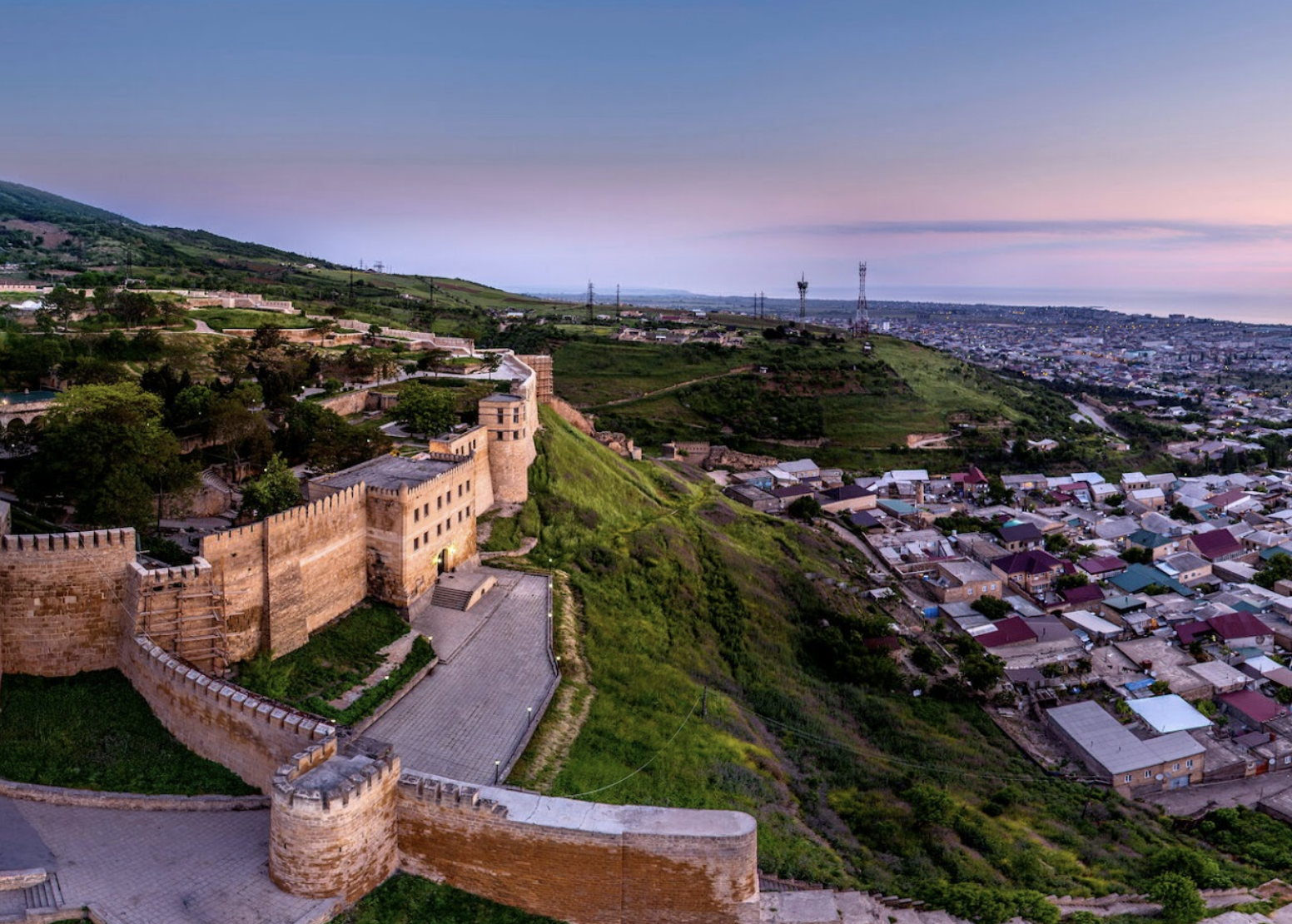 In this social justice curricular unit, intermediate learners explore questions related to identity, diversity, and inclusion in contemporary Russia. Through the interpretation of various cultural viewpoints, stereotypes, and educational systems, students draw connections between unit content and their own personal experiences and identities. Essential questions addressed in this unit are: Who are Russians? What does it mean to be “native” or to belong somewhere? How is cultural diversity represented in Russian regions and universities? What does the national system of education communicate about identity, diversity, and inclusion? How important is the preservation of national traditions and languages for our identity?
In this social justice curricular unit, intermediate learners explore questions related to identity, diversity, and inclusion in contemporary Russia. Through the interpretation of various cultural viewpoints, stereotypes, and educational systems, students draw connections between unit content and their own personal experiences and identities. Essential questions addressed in this unit are: Who are Russians? What does it mean to be “native” or to belong somewhere? How is cultural diversity represented in Russian regions and universities? What does the national system of education communicate about identity, diversity, and inclusion? How important is the preservation of national traditions and languages for our identity?
Multicultural Paris (French)
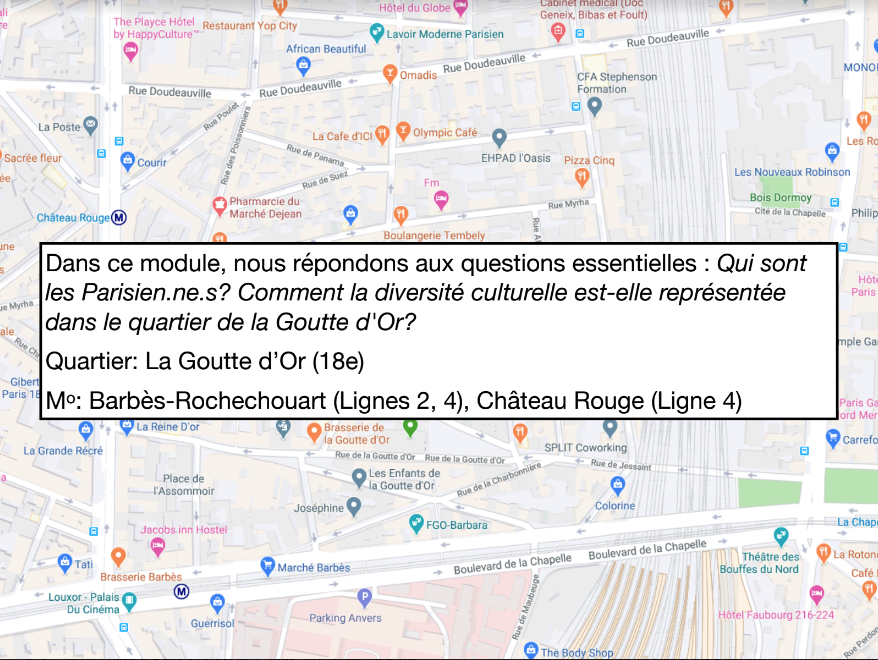 This social justice curricular unit introduces students to the diversity of Parisian neighborhoods through the study of la Goutte d’Or in the 18th arrondissement and engages them with topics of identity and symbolic representations. During this intermediate-level French unit, students explore the following questions: Who are Parisians? How is cultural diversity represented in the neighborhood of la Goutte d’Or? What do national symbols communicate about identity, diversity, and inclusion?
This social justice curricular unit introduces students to the diversity of Parisian neighborhoods through the study of la Goutte d’Or in the 18th arrondissement and engages them with topics of identity and symbolic representations. During this intermediate-level French unit, students explore the following questions: Who are Parisians? How is cultural diversity represented in the neighborhood of la Goutte d’Or? What do national symbols communicate about identity, diversity, and inclusion?
Os saraus brasileiros [Brazilian poetry slams] (Portuguese)
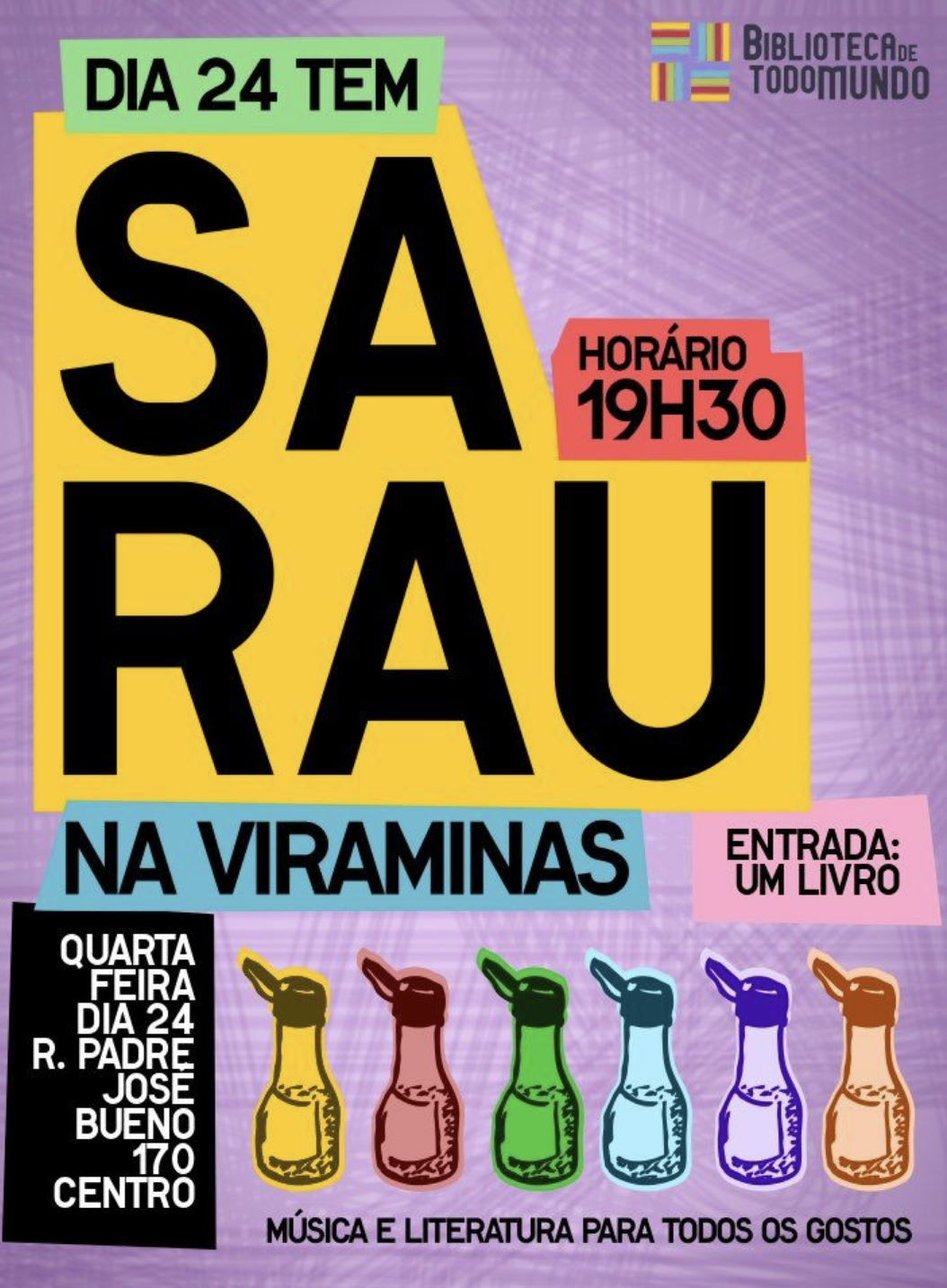 This social justice curricular unit provides an in-depth look at Brazilian poetry slams and their connections to social justice movements in contemporary society. In addition to interpreting poems and promotional materials for poetry slams, students write and perform their own poetry. To achieve these goals, this intermediate-level Portuguese unit explores the following essential questions: What does it mean to be a marginalized group or community in modern Brazilian society? How has slam poetry addressed experiences of marginalization and suffering and offered a voice to the people to express their challenges as well as their pride? How can you address issues of social (in)justice through your own original poetry?
This social justice curricular unit provides an in-depth look at Brazilian poetry slams and their connections to social justice movements in contemporary society. In addition to interpreting poems and promotional materials for poetry slams, students write and perform their own poetry. To achieve these goals, this intermediate-level Portuguese unit explores the following essential questions: What does it mean to be a marginalized group or community in modern Brazilian society? How has slam poetry addressed experiences of marginalization and suffering and offered a voice to the people to express their challenges as well as their pride? How can you address issues of social (in)justice through your own original poetry?
Our Environment: Issues, Impact, and Activism (Arabic)
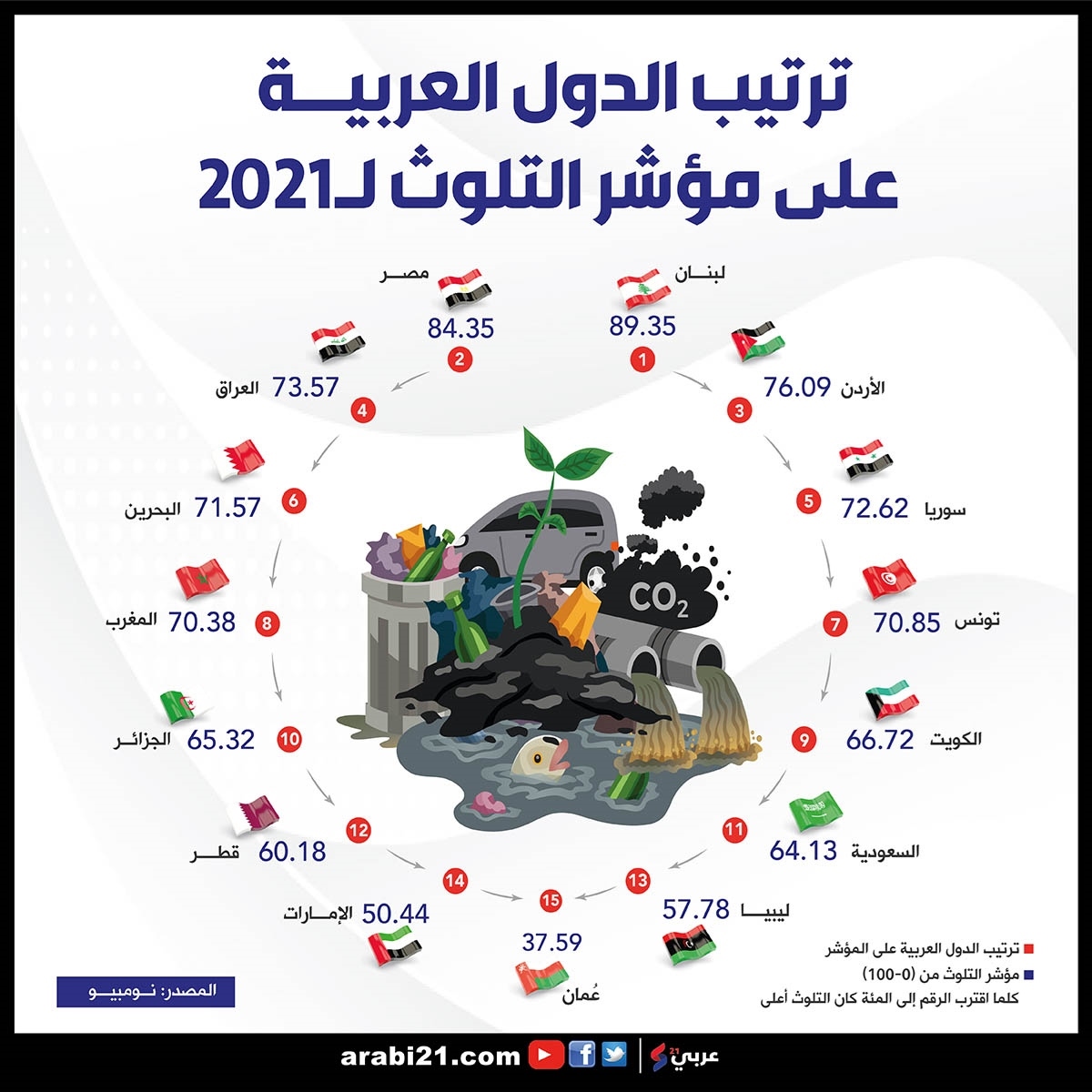 In this intermediate-level social justice curricular unit, learners of Arabic study environmental threats in the Arab world. In addition to explaining how these threats impact communities and individuals, students also explore solutions to problems of pollution, heat, and the like. Essential questions addressed in this unit include: To what extent is working toward a healthier environment a pressing matter in the Arab world and in your own community? What lessons can we learn from the environmental practices of other communities, historically and today? What makes awareness-raising and action around environmental issues challenging? What can contribute to their success? What role can individuals, especially young people, and community organizations play in addressing environmental issues?
In this intermediate-level social justice curricular unit, learners of Arabic study environmental threats in the Arab world. In addition to explaining how these threats impact communities and individuals, students also explore solutions to problems of pollution, heat, and the like. Essential questions addressed in this unit include: To what extent is working toward a healthier environment a pressing matter in the Arab world and in your own community? What lessons can we learn from the environmental practices of other communities, historically and today? What makes awareness-raising and action around environmental issues challenging? What can contribute to their success? What role can individuals, especially young people, and community organizations play in addressing environmental issues?
Proud to be Franco-Louisianian (French)
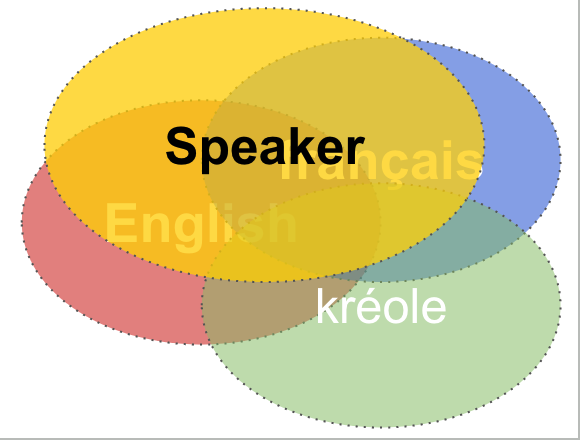 In this social justice curricular unit, intermediate-level learners of French explore various perspectives on linguistic security and insecurity in Louisiana and relate them to their own lived experiences and linguistic identities. Students furthermore analyze initiatives that promote or hinder linguistic security and design their own initiative to promote linguistic pride. The unit is framed by the following questions: How are the language(s) we speak a part of our identity(ies)? Why is linguistic security and/or pride important and how can communities promote it?
In this social justice curricular unit, intermediate-level learners of French explore various perspectives on linguistic security and insecurity in Louisiana and relate them to their own lived experiences and linguistic identities. Students furthermore analyze initiatives that promote or hinder linguistic security and design their own initiative to promote linguistic pride. The unit is framed by the following questions: How are the language(s) we speak a part of our identity(ies)? Why is linguistic security and/or pride important and how can communities promote it?
